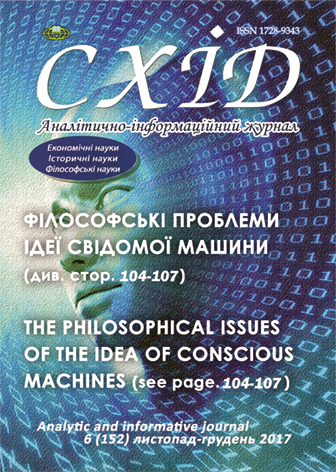Theodicy of Benedictus Spinoza
DOI:
https://doi.org/10.21847/1728-9343.2017.6(152).122358Keywords:
The God, Ideas, proofs for God, Spinoza's God, panentheism, ehtics, ontology, Metaphysics, Theodicy, Natural Theology, transcendence, Truth, contemplationAbstract
This article examines Baruch Benedictus Spinoza conceptual understanding of the proofs for the existence of God. It traces the evolution of this theme pursuant to the metaphysical studies of Moderns Philosophy. Тhe concept of God in the philosophy of Spinoza is considered by exploring the nature of the relations between the transcendent sphere of God and the spiritual world of the human person. Spinoza argues from the possibility of God's existence to God's necessary existence. God is an absolutely infinite substance, necessarily exists, qua Natura Naturans is immutable. God or Nature. The universe is an expression of God's nature, qua Natura Naturata - God is its immanent cause. Spinoza's God is synonymous with Nature. Substance is defined as "in itself". Spinoza understands a substance to be something that is self-caused and self-explained. The transcendence is understood as an ontological category, being discussed in connection with the key themes of Christian philosophy (Anry Bergson, Moris Blondel and Wladimir Soloviev), such as time and eternity, person and history, creation and God etc. Spinoza's concept of God is referring to the God of the monotheistic religions, God as One Substance, pertains to a concept of the oneness of God, is transcendent and therefore "unknowable". Spinoza's definition of God found on the first page of the Ethics: Being absolutely infinite. From the point of view of historiography, the role of the book "Ehtics" by Spinoza is highlighted.
Downloads
References
Zavidniak, B. (2012). Problem of Prometheism in European Culture: Based on the comparative characteristics of Prometheus in Goethe and Faust-Baryshnik in the Annette von Drost-Gulshof. Scientific Notes of the Ukrainian Catholic University. Number III. Philosophy 1. Lviv: 181-194 (ukr).
Kaufman,I.(2000). The order of being and thinking in the Spinoza system. Thesis for the degree of doctor of philisiphical sciences. StPetersburg : 198 p. (rus).
Konnikov, I.(1971). Materialism of Spinoza. Nauka, Moscow (rus).
Robinson, L. (1913). Metaphysics of Spinoza. Shipovnik, St. Petersburg: Available at: http://www.ruthenia.ru/logos/number/59/10.pdf
Spinoza, B. (1957). Treatise on the improvement of the mind and on the path that is best directed towards the true knowledge of things: [translat.], vol. 1. Moscow : 317-358 (rus).
Soloviev,Vladimir (1966). The concept of the god of Spinoza. Voprosy filosofii i psikhologii, 1897, book. 3/38 (reprint: "The concept of God (In defense of the philosophy of Spinoza), 1897. St. Petersburg -Brussels: 3-29 (rus).
Fisher, K. (2005). History of the New Philosophy. Benedikt Spinoza [translat.], Tranzitkniga, Moscow (rus).
Frank, S. (1973). Teachings of Spinoza about the attributes. Voprosy filosofii i psikhologii, 1912, book. IV (114). Mysl, Moscow (rus).
Curley, Е. (1969). Spinoza’s metaphysics: an essay in interpretation. Harvard Univ. Press, Cambridge (Mass.) (eng).
Eucken, R. (1925). Great thinkers and their views on life. Problems of life in historical development from Plato to our times [translat.]. Vol. II. Modern times, Lviv-Poznan (pol).
Fischer, К. (1865). Baruch Spinoza's life and character. A lecture. Mannheim, (germ).
Gebhardt, С. (1959). Introduction to the "Short Essay on God, Man and His Happiness". Hamburg (germ).
Norell, T. (2015). A Comprehension of Spinoza’s God: Through the Dichotomy of Labels. Lund University Sweden (eng).
Saw, R. (1951). The Vindication of Metaphysics. A Study in the Philosophy of Spinoza, London (eng).
Spinoza, Baruch de (1972). Tractatus de intellectus emendatione // Baruch de Spinoza. Opera. Nach der von Carl Gebhardt besorgten Ausgabe von 1925. Bd. I-IV / neu bearbeitet von Wolfgang Bartuschat. Bd.II. Heidelberg, Carl Winter-Verlag 1925. Unveränderter Nachdruck: Heidelberg: Carl Winter-Verlag, 1972.
Spinoza, Baruch de (1972). Ethics In: Spinoza: Complete Works [translat.] Unveränderter Nachdruck: Heidelberg: Carl Winter-Verlag (eng).
Spinoza, B. (2002). Ethics In: Spinoza: Complete Works [translat.] Hackett Publishing, Indianapolis (eng).
Wolfson, H. A. (1958). The Philosophy of Spinoza, unfolding the latent processes of the reasoning. Cambridge-Massachusets-Harvard University Press 1934-1948. Pelikan Books: New York (eng).
Wolfson, H. A. (1947). Philo. Foundations of Religious Philosophy in Judaism, Christianity and Islam: 2 vol., Cambridge (Mass.) (eng).
Downloads
Published
How to Cite
Issue
Section
License
Copyright (c) 2018 Bohdan Zavidnyak

This work is licensed under a Creative Commons Attribution-NonCommercial-NoDerivatives 4.0 International License.
1. Authors bear responsibility for the accuracy of facts, quotations, numbers and names used.
2. Manuscripts are not sent back.
3. The publisher does not always agree with the authors' opinion.
4. The authors reserve the right to authorship of the work and pass the first publication right of this work to the journal under the terms of a Creative Commons Attribution-NonCommercial-NoDerivatives 4.0 International License. This license allows others to distribute (copy) the published work for non-commercial purposes, provided there is mandatory attribution to its authors and a link to the first publication in our journal.
5. The authors have the right to conclude separate supplement agreements that relate to non-exclusive work distribution in the form in which it has been published by the journal (for example, to upload the work to the online storage of the journal or publish it as part of a monograph), provided that the reference to the first publication of the work in this journal is included.

